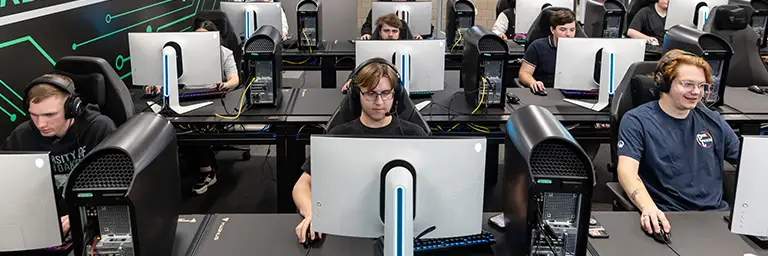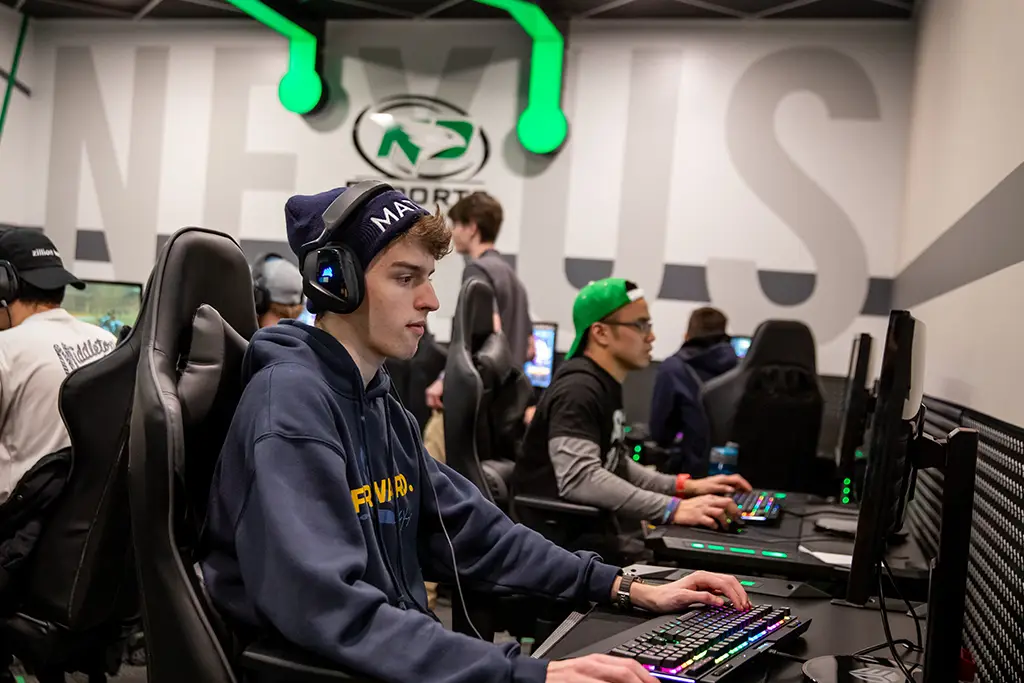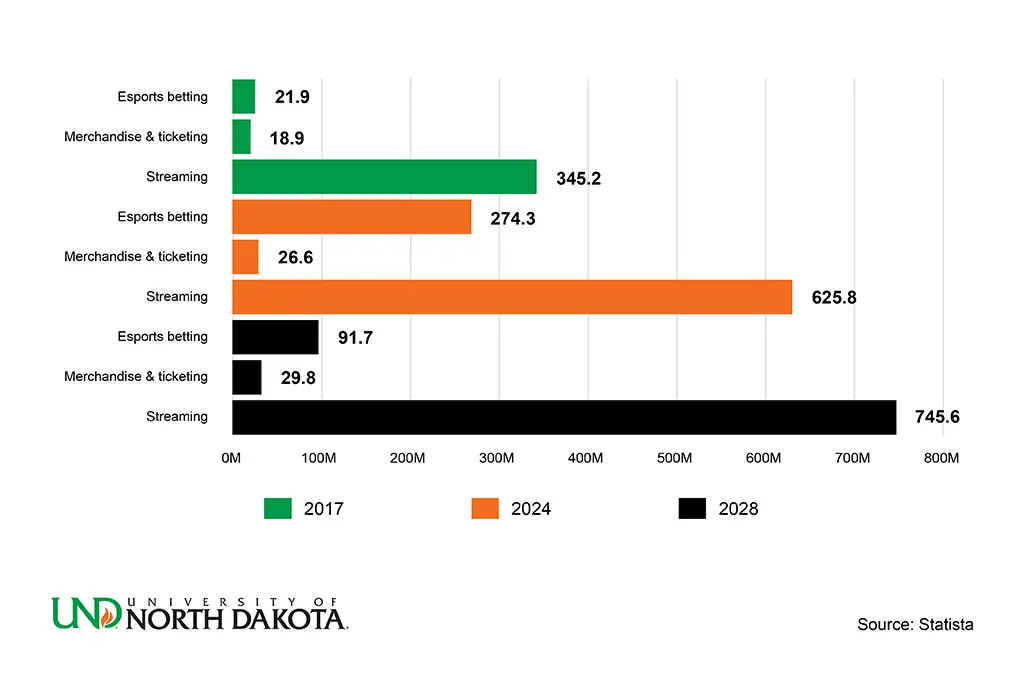
What Are Esports? A Guide for Curious Newcomers
Esports, short for electronic sports, refers to the organized competitive playing of video games, where individuals or teams often engage in structured tournaments and leagues.
Request Information
From our earliest days, video games have been a beloved pastime, a digital playground where we've forged friendships, tackled challenges, and crafted our own adventures. For many, gaming was once considered a fleeting childhood phase, something to be set aside as we grew older and pursued more conventional paths. But what if it could lead to a thriving career avenue? Well, thanks to esports, it can.
So, what are esports? Read on, and you'll find out how competitive gaming has evolved into a global phenomenon and, more importantly, a legitimate and lucrative career choice.
What Are Esports?
Esports is a category of sports in which electronic systems are central to the activity. It typically involves competitive video gaming at both professional and amateur levels, organized through various leagues, rankings, and tournaments.
The question of whether esports should be classified as a sport has been a topic of debate for years. According to Seth Jenny, a notable researcher in the field, esports incorporates several elements traditionally found in sports since they are also "organized by rules, require skill, and have a broad following."
On the other hand, many dismiss this esports definition and instead focus on the idea that esports lacks the physical activity typically associated with sports. However, this argument is increasingly being challenged as esports athletes must maintain physical and mental fitness to perform at their best.
Nowadays, esports has grown into a global phenomenon, with millions of players and spectators participating in or watching tournaments that can rival many traditional sports in viewership and prize money.
Types of Esports
Esports encompasses many video game genres with different gameplay mechanics. Some of the most popular types include:
Multiplayer Online Battle Arena (MOBA)
In MOBA games, two teams of players compete to destroy each other's base. Each player controls a character with specific abilities, and teamwork is essential to outmaneuver and outfight the opposing team.
League of Legends (LoL) and DotA are some of the most popular MOBA games globally, featuring intense team-based strategy.
First-Person Shooters (FPS)
FPS games put players in a first-person perspective where they use firearms and other weapons to defeat opponents. Precision, reflexes, and map knowledge are critical to success in this genre.
Some examples of such gameplay include Counter-Strike 2 (CS2), Call of Duty, Valorant, and Overwatch.
Fighting Games
In fighting games, players control characters in one-on-one combat, using a variety of attacks and combos to defeat their opponents. The genre emphasizes timing, strategy, and mastery of specific characters.
Street Fighter and Smash Bros are just some of the many games that fall under this category.
Sports-based Titles
These games simulate real-world sports, allowing players to control teams or individuals in matches that mimic traditional sports events.
EA Sports FC (previously known as FIFA), Rocket League, and F1 Series let players experience the thrill of various traditional sports.
How Esports Have Grown Recently
Esports has experienced explosive growth in recent years. Streaming platforms like YouTube and Twitch have played a big role in its increased influence on mainstream media and entertainment. In a Forbes article, Felix LaHaye, founder of United Esports, stated: "From a marketing standpoint, a cultural standpoint, and a media standpoint, gaming today is like MTV in the 1980s."
This growth can also be noticed when analyzing the increase in user base. In esports betting, the user base surged from 21.9 million in 2017 to 74.3 million by 2024, showcasing the increasing popularity of wagering on competitive gaming. Merchandise and ticketing also saw a substantial rise, from 18.9 million users in 2017 to 26.6 million in 2024, reflecting the growing fan engagement in live events. However, the most remarkable growth occurred in streaming, where the number of users nearly doubled, climbing from 345.2 million in 2017 to 625.8 million by 2024.
Recognizing the growing importance of esports, the University of North Dakota (UND) has positioned itself as a leader in this space. In 2022, UND became the first university in North Dakota to offer a Bachelor of Science in Esports. This interdisciplinary degree program spans kinesiology, communication, business, and computer science, providing students with an education specifically tailored to the esports industry.
According to UND Varsity Esports Head Coach Ryan Kraus, the rapid growth of esports has been remarkable. Reflecting on the industry's evolution, Kraus noted, "Being able to see the growth of Esports in such a short time has been tremendous. There's a little kid in me that wishes that I could have competed in stuff like this when I was younger, but I'm just as happy to kind of navigate into the future of Esports."
UND's commitment to esports extends beyond academics. The university also opened a state-of-the-art esports facility in Swanson Hall, providing a dedicated space for its Varsity Esports team. Kaleb Dschaak, founder of Fenworks and a recent UND graduate, emphasized the new opportunities this would bring: "They're going to see a space for them to belong, they're going to see opportunities to be an athlete that weren't there to them before."
The Best Esports Teams You Should Know About
Some of the most prominent teams currently competing in esports include (in no particular order):
Astralis
Astralis is a name synonymous with dominance in the CSGO scene. They quickly rose to prominence, securing their first major victory at the ELEAGUE Major in Atlanta in 2017. Their disciplined gameplay and innovative strategies have since led them to further success, including consecutive wins at the Intel Extreme Masters in 2019 and 2020.
Evil Geniuses
This is one of the oldest and most respected names in esports. Initially focused on the game Quake, the organization soon expanded into other major titles like Counter-Strike and DotA. Their history is accentuated by their wins in The International 2015 Dota 2 Championship and the 2018 Call of Duty World League Championship.
Team Liquid
Team Liquid started as a StarCraft community before transitioning into a full-fledged esports team by 2010. Over the years, they have expanded into multiple games, including League of Legends, where they won four consecutive LCS titles, and Dota 2, where they claimed victory at The International 2017.
FaZe Clan
FaZe Clan's origins can be traced back to 2010, when it began as a YouTube sniping team. Over the years, they diversified into competitive gaming, becoming a formidable force in Call of Duty and CS. Their legacy includes multiple victories at Call of Duty Championship tournaments, with significant wins in the CWL Pro League 2018 and the CWL Championship 2020. Moreover, their success in CS, marked by a win at the ELEAGUE CS Premier in 2017, is proof of their versatility and competitive edge.
Fnatic
Established in 2004 in the UK, Fnatic has consistently been a formidable presence in esports, particularly in League of Legends. Their victory at the first-ever League of Legends World Championship in 2011 and three major championships in CS are among the many accolades that have cemented their status as one of the most successful esports organizations globally.

The Biggest Esports Tournaments to Watch
The world of esports is packed with many thrilling tournaments that showcase top-tier talent and captivate audiences globally. Some of the biggest esports tournaments are:
The International (Dota 2)
The International is synonymous with grandeur in the esports world, with prize pools that often exceed $2.7 million. Held annually, it gathers the best Dota 2 teams from around the globe.
League of Legends World Championship (LoL Worlds)
LoL Worlds is one of the most prestigious events in the esports calendar, consistently drawing over 100 million viewers worldwide. Over the years, this tournament has been the stage for some of the most emotional and unforgettable moments in esports history.
Counter-Strike 2 Major Championships
The Major Championships continue to be a central event for the FPS community. These tournaments have become known for their high-stakes matches and the incredible skill displayed.
Valorant Champions Tour (VCT)
Valorant has rapidly grown into one of the top esports, with the VCT Masters and Champions tournaments leading the charge. The VCT is known for its unpredictable outcomes, where strategies evolve quickly, and the meta shifts dramatically from one tournament to the next.
Call of Duty League World Championship (CDL Champs)
The CDL Champs is the culmination of a year-long battle in the Call of Duty esports scene. Teams qualify through events before the World Championship.
Adding to the excitement of these major tournaments, events like the Fenworks Esports State Tournament hosted by UND also helped introduce the next generation of talent to the competitive world of esports. Tournaments like this can be a preview for high school students aspiring to compete on the big stages one day.
How to Become an Esports Player
Many people assume that esports is just about sitting and playing games. But, the reality is that joining the field and competing at a professional level involves much more than just casual gaming; it requires intense training, a deep understanding of the game mechanics, and knowing the right people.
The first step is to choose a game to specialize in, as focusing on one game allows you to develop deep expertise and master its mechanics. Daily practice sessions, often lasting several hours, help you refine your techniques, understand the game's meta, and improve your reflexes. It's also essential to stay updated with the latest strategies used by top players and teams and adapt them to your playstyle.

Esports User Growth
| Esports User Growth | 2017 | 2024 | 2028 |
|---|---|---|---|
| Esports Betting | $21.9M | $274.3M | $91.7M |
| Merchandise & Ticketing | $18.9M | $26.6M | $29.8M |
| Streaming | $345.2M | $625.8M | $745.6M |
Competing in online and local tournaments is another fundamental step. These competitions offer a platform where you can showcase your skills, gain experience under pressure, and make a name for yourself in the community. Networking within the esports community is equally as important. Engaging with other players, joining teams, and building connections with coaches and sponsors can open doors to professional opportunities.
While a degree isn't necessary to play, many other careers within the esports industry do benefit from formal education. For those interested in these roles, pursuing a degree in relevant fields can provide valuable knowledge and skills. Whether you're aiming to be a player or work behind the scenes, success in esports comes from a combination of practice, strategy, and strong industry connections.
The Impact and Future of Esports
In 2024, the esports market worldwide is projected to reach a revenue of approximately $5.9 billion. By 2029, it is anticipated to reach $5.7 billion. The United States is set to lead it, generating the most revenue with an expected market volume of $1.07 billion. This dominance can be attributed to the strong infrastructure, sponsorship deals, and media coverage that have made the US a hub for esports activities. Furthermore, the US is predicted to reach 65.77 million esports users, from 49.98 million in 2024.
By 2028, the esports industry is also expected to witness a significant surge in its user base across various segments. Esports betting is projected to reach an impressive 91.7 million users, reflecting the growing interest in wagering on competitive gaming. In fact, this is one of the largest segments within the sports industry, expected to generate a market volume of $2.5 billion in 2024 alone.
Merchandise and ticketing will see an estimated user base of 29.8 million, indicating a steady demand for esports-related products and live event attendance. However, the most dramatic growth will occur in streaming, with a staggering 745.6 million users anticipated by 2028. This exponential increase stresses streaming's central role in the esports ecosystem, solidifying it as the primary platform for both players and fans to connect and engage with the sport.
Numbers aside, esports will likely continue to see the expansion of academic and extracurricular programs at educational institutions. This growth reflects a broader acceptance of esports as a legitimate competitive activity, much like traditional sports.
Additionally, technological advancements, such as virtual reality and augmented reality, are expected to create new immersive experiences for both players and spectators. The continued integration of these technologies will likely lead to more engaging and interactive tournaments.
As esports continues to grow, the industry is also expected to see further professionalization, with more structured career paths and opportunities for players, coaches, and other professionals.
Conclusion
Esports might have once been brushed off as a niche interest or an unorthodox career choice, but it's clear that this field has matured into a respected and exciting profession. At UND, we recognize its immense potential and significance, offering academic training to those eager to make their mark. The game is always changing, but with Esports at UND, you will always level up.
FAQs
Gaming is a broader term for all video game activities, including casual play. On the other hand, esports is a specialized gaming segment involving structured, organized competitions where individuals or teams compete in video games at a professional level. So, while all esports are gaming, not all gaming qualifies as esports.
Esports teams and organizations operate similarly to traditional sports franchises. They have structured management, dedicated coaching staff, professional players under contracts, and specialized departments for marketing.